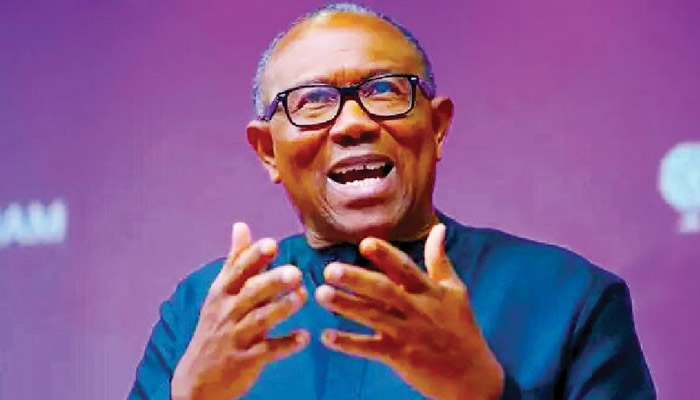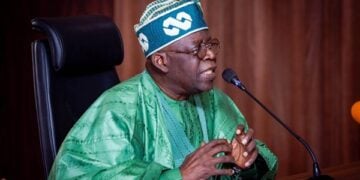The Labour Party presidential candidate in 2023, Mr. Peter Obi, has decried what he described as the government’s indifference to the plight of ordinary Nigerians and called for a new national culture rooted in sacrifice, accountability and productivity.
Speaking at the official presentation of a new book, Obi: The Political Change Agent, authored by veteran journalist, Ike Abonyi, Obi said Nigeria’s leadership structure is unresponsive and unproductive, fueling poverty, insecurity, and economic stagnation.
“This system does not care for you. Anyone who says otherwise is not telling the truth. We have millions of children out of school. People don’t know where their next meal will come from. Yet, those in government and business are producing poverty instead of value,” Obi said.
He criticised the misuse of public funds, blaming corruption and illicit wealth for distorting the economy and undermining the value of the naira.
“When people are corrupt, they’re selling money without creating value. They are manufacturing poverty. If we take stolen money out of circulation, our currency will regain its true value,” he stated.
Citing examples from other African nations such as Angola and Ghana, Obi argued that transparent governance and structural reforms have helped drive economic progress elsewhere on the continent.
On the issue of subsidy removal, he emphasised the need to first address systemic corruption.
“Yes, I said I would remove subsidy—but I would start by removing the criminality within it. That’s what drives the cost up,” he said.
Obi also lamented the collapse of infrastructure that once supported Nigeria’s agricultural and industrial sectors.
“The colonialists built railways to support agriculture and industry. We destroyed them. Today, no trailers or trains are moving goods — that’s a clear sign of an unproductive economy,” he added.
He urged Nigerians to prioritise electing competent and sincere leaders, particularly legislators, stressing that the failure to ensure quality representation must not be repeated.
“We need people who genuinely want to serve, not those seeking wealth through politics. This time, we must vote—and our votes must count,” he said.
Obi concluded by urging citizens to embrace sacrifice and reject shortcuts, noting that national progress demands consistent effort and collective responsibility.
“There is no shortcut. If we keep searching for one, we will never arrive. Let us keep sacrificing—that’s the only path forward.”
The event drew supporters, civil society leaders, and political observers, many of whom applauded Obi’s call for a new political culture grounded in service and productivity.
National Coordinator of the Obidient Movement, Dr Yunusa Tanko described the book as “not just a literary work, but a consolidation of political philosophy built on public trust.”
He hailed the growth of the Obidient Movement from a social media campaign into a formidable grassroots force.
“This gathering is more than a book launch—it’s a call to action to reshape our democracy, restore dignity, and build a Nigeria where everyone can thrive,” Tanko said.
He revealed that the movement now has structures in 28 states and over 540 local government areas, with ongoing outreach to complete nationwide mobilization. Over 200 support groups were recognized for their volunteer contributions.
Acting chairman of the Labour Party and Chair of the occasion, Senator Nenadi Usman praised the author and emphasised the deeper symbolism of the book.
“This isn’t just Peter Obi’s story—it’s a mirror to our national conscience, one that puts accountability above impunity and prudence over recklessness,” she said.
Spanning 26 chapters and 250 pages, the book chronicles Obi’s political journey and the rise of the Obidient Movement, offering in-depth analysis of electoral reform, ideological resistance, and civic courage.
In his keynote address, Prof. Sam Amadi, offered a sobering analysis of Nigeria’s economic challenges.
He described worsening poverty, unemployment, and inequality as systemic, warning that without honest diagnosis and genuine reform, meaningful progress would remain elusive.
“Peter Obi represents a disruption to this failed system. He has the pedigree, personality, and passion needed to lead a democratic and developmental revolution,” Amadi said.
He highlighted grim statistics on poverty and power generation, contrasting Nigeria’s stagnation with Taiwan’s transformation since 1999.
“We’re not just poor—we’re getting poorer. The new Nigeria is not a dream; it’s a necessity,” he declared.
Author Ike Abonyi explained that the book was inspired by conversations with international observers seeking to understand Obi’s impact.
“I have an American friend, Peter Clark, who has covered Nigerian politics for over a decade. When his friends plan to visit Nigeria, they consult him. After some discussions with them, the idea for the book was born—to inform those abroad who are deeply invested in Africa getting the right leadership,” Abonyi said.
He clarified that the book does not fully capture the story of the Peter-to-President (P2P) movement.
“That story will be told by others more skilled than I am—when the time is right. But this book captures the nation. When journalists come to Nigeria to understand what happened in 2023, this book will tell the story,” he concluded.





